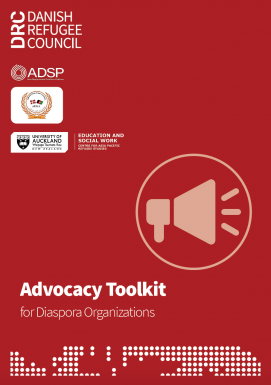ADSP Advocacy Toolkit
This toolkit has been developed to offer practical guidance to diaspora actors in different areas: (1) Diaspora Fundraising, (2) Community Outreach (3) Networking and Alliances Building and (4) Advocacy.
Diaspora communities, organisations, and individuals are increasingly vocal and influential, advocating for social, economic, and political change in their country of origin, the country of residence and in the international sphere. This toolkit provides practical guidance for diaspora organisations in their advocacy work.
Section 1 begins with a brief introduction by providing the definition of advocacy and highlighting its relevance to the diaspora. The section also presents an overview of the different approaches to advocacy and key concepts to consider before engaging in advocacy work.
Section 2 outlines the main steps in developing an advocacy strategy, consisting of prioritising advocacy issues, analysing the external context, setting the theory of change, goal, objectives and indicators, defining the target audience, developing the core message, selecting the right approach and planning monitoring, evaluation and learning. The section also provides examples of tools with step-by-step descriptions and templates to guide diaspora actors in the multi-stage process of developing an advocacy strategy.
Section 3 provides examples of methods that can be used at different levels of advocacy, including local, national, and transnational levels. The section presents a detailed description of selected methods that can be used to conduct advocacy with specific focus on their relevance for diaspora communities. The selected methods elaborated in the section are: making use of inside track, making use of international mechanisms, using (social) media and promoting/protesting countries of origin.
Section 4 discusses the potential risks that may occur throughout the project cycle of an advocacy campaign with a specific focus on the risks of diaspora advocacy in fragile contexts. The section also offers tools and strategies to navigate these challenges and minimise risks.
Section 5 addresses the often-overlooked aspect of emotions in advocacy work and presents some tools and guidance focussing on the role of self- and collective care.
Section 6 offers conclusions and recommendations to diaspora actors and organisations in their advocacy.
The toolkit can be found here.

